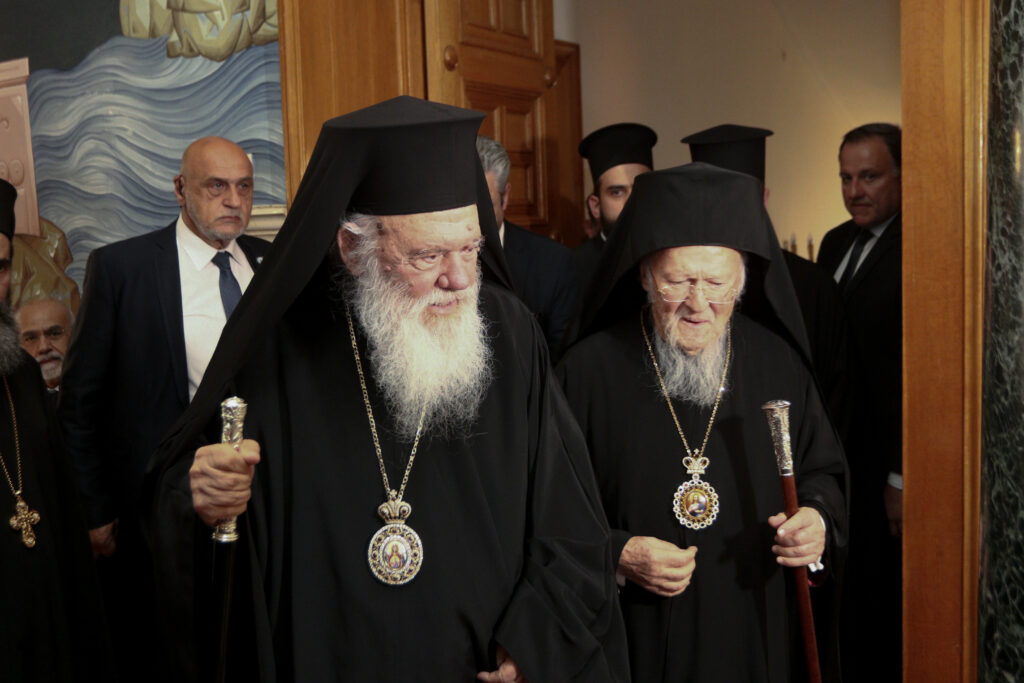The first day of Ecumenical Patriarch Bartholomew’s visit to Athens


His All-Holiness Ecumenical Patriarch Bartholomew is currently visiting Athens, from Monday 15 April 2024, at the invitation of the Prime Minister of Greece, Mr. Kyriakos Mitsotakis, to attend and speak at the 9th International “Our Ocean” Conference. Upon his arrival at Athens Airport, His All-Holiness was welcomed by representatives of the Hellenic Government and the Church of Greece, clergy and his relatives.
In the afternoon of the same day, His All-Holiness visited His Beatitude Archbishop Ieronymos of Athens and all Greece, who, being joined by his Protosyncellus, Archimandrite Varnavas Theoharis, clergy of the Archdiocese of Athens and his associates, welcomed Patriarch Bartholomew cordially at the entrance of the Archbishop’s residence of Saint Philothei and then they had a long private fraternal meeting, where, among other things, the Patriarch expressed his joy for his visit to the capital of Greece and his new meeting with the Archbishop.
In the evening, His All-Holiness attended a dinner hosted in his honour by the Board of Directors of the Athenian Club, chaired by Mr. Koukoulomatis, at Athenian Club facilities. The dinner was also attended by His Beatitude Archbishop Ieronymos of Athens and all Greece, Hierarchs, representatives of the Political, Military and Academic world of Greece, Lord Archons of the Great Church of Christ and other esteemed guests.
In his speech, His All-Holiness described the Athenian Club as a “historical institution and symbol of the recent period of the glorious city of Athens, the capital of Greece”, the spirit of which, as he said, is a combination and expression of spiritual and humanitarian values, which know no borders and have a global scope. And he went on to say:
“We believe in the four-pointed unity of the Nation, in the presence and new fruition of the ancient Greek spirit in Byzantium, so that it has been rightly noted that “Hellenism Byzantizes”, according to Westerners that “in Byzantium the ancient Greek spirit was never extinguished”, or even, according to the Late Fr. Georgios Florovsky, that “Hellenism was completed within the Church”.
The ideals of the Nation are preserved and enriched with community substance during the period of Ottoman rule, and in the new entity of the Neo-Hellenic state and the creative tension between ancient roots, of Byzantine and post-Byzantine heritage, newer and modern orientations and the many adventures of the Nation, the modern identity of Greece is created, about which the words of Odysseus Elytis apply, from ‘The Axion esti’: “though touching asia on one side * and brushing europe on the other *it stands there all alone * in aether and in sea”.
How “alone” I wonder is the country, in which the great idea of freedom was born, which has defined the course of history since then, enriched by Christianity through its association with “being in Christ and for Christ”, with the “truest freedom” as a gift which, in its experience and eternal perspective, exceeds the limits of all humanity, expressed as sacrificial love, a love “which does not seek itself”, but “seeks out the other”.




